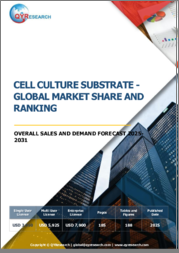
|
시장보고서
상품코드
1539339
세포 조직 배양 용품 시장 : 세계 산업 분석, 규모, 점유율, 성장, 동향, 예측(2024-2033년)Cell Tissue Culture Supplies Market: Global Industry Analysis, Size, Share, Growth, Trends, and Forecast, 2024-2033 |
||||||
Persistence Market Research는 최근 세계 세포 조직 배양 용품 시장에 대한 종합적인 보고서를 발간하여 주요 촉진요인, 동향, 기회, 과제 등 시장 역학에 대한 심층적인 인사이트를 제공했습니다. 이 보고서는 생명공학 및 생명과학 분야의 새로운 동향을 활용하고자 하는 업계 이해관계자들에게 특히 가치 있는 시장 구조와 향후 전망에 대한 심층적인 이해를 제공하는 것을 목표로 하고 있습니다.
주요 인사이트
- 세계 시장 매출(2022년) : 159억 달러
- 추정 시장 가치(2033년) : 413억 달러
- 세계 시장 성장률(2022-2033년 CAGR) : 11.2%
세포 조직 배양 용품 세계 시장 - 보고서 범위:
세포 및 조직 배양 용품 시장에는 세포 및 조직 배양 절차에 필요한 다양한 소모품 및 장비의 생산 및 유통이 포함됩니다. 이러한 소모품은 통제된 환경에서 세포의 증식, 유지 및 조작에 필수적이며, 바이오의약품, 재생 의학 및 백신 개발의 발전에 필수적입니다.
시장 성장 촉진요인:
이머징 마켓 플레이어, 규제 감독, 위탁 생산
세포 및 조직 배양 용품 세계 시장은 세포배양 배지를 사용하여 광범위하게 생산되는 단클론항체에 대한 수요 증가로 인해 크게 성장할 것으로 예상됩니다. 바이오의약품, 인공장기, 첨단 세포 및 조직 배양 기술에 대한 수요 증가가 시장을 주도하고 있습니다. 또한, 위탁 생산의 도입과 규제 감독에 대한 집중은 시장 성장을 더욱 가속화할 것으로 예상됩니다.
조직 이식 및 백신 개발의 발전
질병이나 부상으로 인한 장기 및 조직 손실은 이식의 필요성을 줄이는 치료법 개발의 큰 원동력이 되고 있습니다. 예를 들어, FDA의 승인을 받은 정형외과 분야 최초의 생물학적 제제인 피질(Cortical)은 소 태아 혈청을 조직 이식을 위한 영양 성분으로 사용하고 있습니다. 감염성 질환의 증가로 인해 효과적이고 안전한 백신에 대한 수요도 증가하고 있습니다. 세포배양 기반 백신은 기존 방식에 비해 효능과 안전성 향상 등 많은 장점이 있어 시장 확대에 기여하고 있습니다.
시장의 과제
높은 비용과 무균성에 대한 우려
세계 세포 조직 배양 용품 시장은 연구개발 활동에 따른 높은 비용 등 큰 도전에 직면해 있습니다. 조직 배양 배지 제조는 아미노산, 단백질, 탄수화물 등 각 성분을 특정 비율로 첨가해야 하고, 정확한 배합이 필요하기 때문에 특히 비용이 많이 듭니다. 또한, 세포배양 배지 개발 과정은 복잡하고 시간이 오래 걸리기 때문에 전체 시장의 성장을 저해할 것으로 예상됩니다.
무균성 문제도 이 시장에 큰 도전이 되고 있습니다. 배양액에 여러 종류의 세포가 존재하면 오염의 위험이 높아지기 때문에 조직 배양액의 오염을 방지하는 것이 매우 중요하며, 체외 기술은 특히 화학적 및 미생물 오염에 취약하여 세포배양 실험의 성공에 심각한 영향을 미칠 수 있습니다. 연구 장비의 높은 비용과 오염 가능성으로 인해 특히 중소기업에서 이러한 공급품의 채택이 제한될 수 있으며, 이는 시장 성장을 제한할 수 있습니다.
본 보고서에서 다루는 주요 질문들
- 세포 조직 배양 용품 세계 시장 성장을 촉진하는 주요 요인은 무엇인가?
- 세포 조직 배양 용품의 채택을 주도하는 소비자층은?
- 조직 이식 및 백신 개발의 발전은 경쟁 상황에 어떤 영향을 미치고 있는가?
- 세계 세포 조직 배양 용품 시장에서 주요 업체는 누구이며, 시장 지위를 유지하기 위해 어떤 전략을 취하고 있는가?
- 세포 조직 배양 용품 세계 시장에서의 새로운 트렌드와 전망은?
목차
제1장 주요 요약
제2장 시장 개요
- 시장 범위/분류
- 시장 정의/범위/제한
- 포함과 제외
제3장 주요 시장 동향
- 시장에 영향을 미치는 주요 동향
- 제품 혁신/개발 동향
제4장 부가가치 인사이트
- 규제 역학
- 상환 시나리오
- 기술 평가
- PESTEL 분석
- Porters 분석
제5장 시장 배경
- 거시경제 요인
- 예측요인 - 관련성과 영향
- 시장 역학
제6장 COVID-19 위기 분석
- COVID-19와 영향 분석
- 2024년 시장 시나리오
제7장 세계 시장 수요(금액 및 규모) 분석
- 시장(금액) 분석, 2019-2023년
- 시장(금액) 예측, 2024-2033년
- 전년비 성장 동향 분석
- 절대적 수익 기회
제8장 제품별 : 세계 시장 분석
- 소개/주요 조사 결과
- 시장 규모(금액) 분석, 2019-2023년
- 시장 규모(금액) 분석과 예측, 2024-2033년
- 배지
- 혈청 함유 배지
- 무혈청 배지
- 단백질 발현 배지
- 스팀 셀 미디어
- 하이브리도마 미디어
- 1차 세포 배지
- 곤충 세포 배지
- 면역학 미디어
- CHO 세포배양 배지
- 단백질을 포함하지 않는 배지
- 화학적 정의 배지
- 혈청
- 소태아혈청(FBS)
- 성체소혈청(ABS)
- 기타 동물 혈청
- 시약
- 성장인자
- 보충제
- 완충제와 화학제품
- 세포 분리 시약
- 동결 방지제
- 기타
- 용기
- 롤러/루 보틀
- 셀 스택
- 멀티 웰 플레이트
- 플라스크
- 페트리 접시
- 액세서리
- 배지
- 제품별 시장 매력 분석
제9장 용도별 : 세계 시장 분석
- 소개/주요 조사 결과
- 시장 규모(금액) 분석, 2019-2023년
- 시장 규모(금액) 분석과 예측, 2024-2033년
- 바이오의약품 제조
- 진단
- 의약품 스크리닝과 개발
- 조직공학과 재생의료
- 줄기세포 기술
- 암 조사
- 용도별 시장 매력 분석
제10장 최종사용자별 : 세계 시장 분석
- 소개/주요 조사 결과
- 시장 규모(금액) 분석, 2019-2023년
- 시장 규모(금액) 분석과 예측, 2024-2033년
- 제약 및 바이오의약품 기업
- 병원 및 진단 연구소
- 조사·학술기관
- 기타
- 최종사용자별 시장 매력 분석
제11장 지역별 : 세계 시장 분석
- 소개
- 시장 규모(금액) 분석, 2019-2023년
- 시장 규모(금액) 분석과 예측, 2024-2033년
- 북미
- 라틴아메리카
- 유럽
- 동아시아
- 남아시아
- 오세아니아
- 중동 및 아프리카(MEA)
- 지역별 시장 매력 분석
제12장 북미 시장 분석
제13장 라틴아메리카 시장 분석
제14장 유럽 시장 분석
제15장 동아시아 시장 분석
제16장 남아시아 시장 분석
제17장 오세아니아 시장
제18장 중동 및 아프리카 시장 분석
제19장 시장 구조 분석
- 기업 계층별 시장 분석
- 주요 기업의 시장 점유율 분석
- 시장 입지 분석
제20장 경쟁 분석
- 경쟁 대시보드
- 경쟁 벤치마크
- 경쟁 상세
- Thermo Fisher Scientific, Inc.
- BD Diagnostics
- EMD Millipore
- Corning
- Lonza Group
- Others
제21장 사용되는 가정과 두문자어
제22장 조사 방법
ksm 24.09.20Persistence Market Research has recently published a comprehensive report on the global cell tissue culture supplies market, providing detailed insights into market dynamics, including key drivers, trends, opportunities, and challenges. This report aims to offer a thorough understanding of the market's structure and its future outlook, which is particularly valuable for industry stakeholders seeking to capitalize on emerging trends in biotechnology and life sciences.
Key Insights:
- Global Market Revenue (2022): US$ 15.9 Billion
- Estimated Market Value (2033): US$ 41.3 Billion
- Global Market Growth Rate (CAGR 2022-2033): 11.2%
Global Cell Tissue Culture Supplies Market - Report Scope:
The cell tissue culture supplies market encompasses the production and distribution of various supplies and equipment required for cell and tissue culture procedures. These supplies are essential for the growth, maintenance, and manipulation of cells in a controlled environment, making them crucial for advancements in biopharmaceuticals, regenerative medicine, and vaccine development.
Market Growth Drivers:
Emerging Market Players, Regulatory Oversight, and Contract Manufacturing
The global market for cell tissue culture supplies is poised for significant growth due to the increasing demand for monoclonal antibodies, which are extensively produced using cell culture media. The rising need for biopharmaceuticals, artificial organs, and advanced cell and tissue culture techniques is driving the market forward. Additionally, the introduction of contract manufacturing and the focus on regulatory oversight are expected to further accelerate market growth.
Advancements in Tissue Grafting and Vaccine Development
The loss of organs and tissues due to disease and injury is a major driver for the development of therapies that reduce the need for transplantation. For example, Cortical, the first FDA-approved biologic product in orthopedics, uses fetal bovine serum as a nutritional component in tissue grafting. The demand for effective and safe vaccines is also rising due to the increasing prevalence of infectious diseases. Cell culture-based vaccines offer numerous advantages over traditional methods, such as improved efficacy and safety, contributing to the market's expansion.
Market Challenges:
High Costs and Sterility Concerns
The global cell tissue culture supplies market faces significant challenges, including the high costs associated with research and development activities. The production of tissue culture media is particularly expensive due to the precise formulation required, with each component-amino acids, proteins, carbohydrates-needing to be added in specific ratios. Additionally, the complex and time-consuming process of developing cell culture media is anticipated to impede overall market growth.
Sterility concerns also pose a significant challenge to the market. Preventing contamination of tissue culture media is critical, as the presence of multiple cell types in a culture medium increases the risk of contamination. In vitro techniques are particularly susceptible to both chemical and microbiological contamination, which can severely impact the success of cell culture experiments. The high costs of research equipment and the potential for contamination may limit the adoption of these supplies, particularly among small and medium-sized enterprises, thereby restricting market growth.
Key Questions Answered in the Report:
- What are the primary factors driving the growth of the global cell tissue culture supplies market?
- Which consumer segments are leading the adoption of cell tissue culture supplies?
- How are advancements in tissue grafting and vaccine development influencing the competitive landscape?
- Who are the key players in the global cell tissue culture supplies market, and what strategies are they employing to maintain their market position?
- What are the emerging trends and future prospects in the global cell tissue culture supplies market?
Competitive Intelligence and Business Strategy:
Leading players in the global cell tissue culture supplies market, such as Thermo Fisher Scientific, Merck KGaA, and Corning Incorporated, are focusing on innovation, strategic partnerships, and expanding their product portfolios to maintain a competitive edge. These companies are heavily investing in R&D to develop advanced cell culture media and equipment that offer superior performance and reliability. Collaborations with research institutions and biopharmaceutical companies are enhancing market credibility and driving the adoption of cell tissue culture supplies. Additionally, leveraging digital marketing and targeted outreach to life science researchers is key to strengthening market positioning.
Key Companies Profiled:
- Thermo Fisher Scientific, Inc.
- BD Diagnostics
- EMD Millipore
- Corning
- Lonza Group
- Others
Key Segments Covered in Cell Tissue Culture Supplies Industry Research
Product:
- Media
- Sera
- Reagents
- Vessels
- Accessories
Application:
- Biopharmaceutical Production
- Diagnostics
- Drug Screening & Development
- Tissue Engineering & Regenerative Medicine
- Stem Cell Technologies
- Cancer Research
End User:
- Pharma and Biopharmaceutical Companies
- Hospitals & Diagnostic Laboratories
- Research & Academic Institutes
- Others
Region:
- North America
- Latin America
- Europe
- South Asia
- East Asia
- Oceania
- Middle East & Africa
Table of Contents
1. Executive Summary
- 1.1. Global Market Outlook
- 1.2. Demand Side Trends
- 1.3. Supply Side Trends
- 1.4. Analysis and Recommendations
2. Market Overview
- 2.1. Market Coverage / Taxonomy
- 2.2. Market Definition / Scope / Limitations
- 2.3. Inclusions and Exclusions
3. Key Market Trends
- 3.1. Key Trends Impacting the Market
- 3.2. Product Innovation / Development Trends
4. Value Added Insights
- 4.1. Regulatory Dynamics
- 4.2. Reimbursement Scenario
- 4.3. Technology Assessment
- 4.4. PESTEL Analysis
- 4.5. Porter's Analysis
5. Market Background
- 5.1. Macro-Economic Factors
- 5.1.1. Global GDP Growth Outlook
- 5.1.2. Global Healthcare Outlook
- 5.1.3. Global Cell Culture Market Overview
- 5.2. Forecast Factors - Relevance & Impact
- 5.2.1. New Product Approval and Launches
- 5.2.2. Rising Biopharmaceutical Manufacturers
- 5.2.3. High Disposable Income Per Individual
- 5.2.4. Technological Advancements
- 5.2.5. Rising Research and Development Funding
- 5.2.6. Increasing Geriatric Population
- 5.2.7. Product Penetration into Emerging Markets
- 5.3. Market Dynamics
- 5.3.1. Drivers
- 5.3.2. Restraints
- 5.3.3. Opportunity Analysis
6. COVID-19 Crisis Analysis
- 6.1. COVID-19 and Impact Analysis
- 6.1.1. By Product
- 6.1.2. By Application
- 6.1.3. By End User
- 6.1.4. By Country
- 6.2. 2024 Market Scenario
7. Global Market Demand (in Value or Size in US$ Bn) Analysis 2019-2023 and Forecast, 2024-2033
- 7.1. Historical Market Value (US$ Bn) Analysis, 2019-2023
- 7.2. Current and Future Market Value (US$ Bn) Projections, 2024-2033
- 7.2.1. Y-o-Y Growth Trend Analysis
- 7.2.2. Absolute $ Opportunity Analysis
8. Global Market Analysis 2019-2023 and Forecast 2024-2033, By Product
- 8.1. Introduction / Key Findings
- 8.2. Historical Market Size (US$ Bn) Analysis By Product, 2019-2023
- 8.3. Current and Future Market Size (US$ Bn) Analysis and Forecast By Product, 2024-2033
- 8.3.1. Media
- 8.3.1.1. Serum Containing Media
- 8.3.1.2. Serum-Free Media
- 8.3.1.2.1. Protein Expression Media
- 8.3.1.2.2. Steam Cell Media
- 8.3.1.2.3. Hybridoma Media
- 8.3.1.2.4. Primary Cell Media
- 8.3.1.2.5. Insect Cell Media
- 8.3.1.2.6. Immunology Media
- 8.3.1.2.7. CHO Cell Culture Media
- 8.3.1.3. Protein-Free Media
- 8.3.1.4. Chemically Defined Media
- 8.3.2. Sera
- 8.3.2.1. Fetal Bovine Sera (FBS)
- 8.3.2.2. Adult Bovine Sera (ABS)
- 8.3.2.3. Other Animal Sera
- 8.3.3. Reagents
- 8.3.3.1. Growth Factors
- 8.3.3.2. Supplements
- 8.3.3.3. Buffers & Chemicals
- 8.3.3.4. Cell Dissociation Reagents
- 8.3.3.5. Cryoprotective Agents
- 8.3.3.6. Others
- 8.3.4. Vessels
- 8.3.4.1. Roller/Roux Bottles
- 8.3.4.2. Cell Stacks
- 8.3.4.3. Multiwell Plates
- 8.3.4.4. Flasks
- 8.3.4.5. Petri Dishes
- 8.3.5. Accessories
- 8.3.1. Media
- 8.4. Market Attractiveness Analysis By Product
9. Global Market Analysis 2019-2023 and Forecast 2024-2033, By Application
- 9.1. Introduction / Key Findings
- 9.2. Historical Market Size (US$ Bn) Analysis, By Application, 2019-2023
- 9.3. Current and Future Market Size (US$ Bn) Analysis and Forecast By Application, 2024-2033
- 9.3.1. Biopharmaceutical Production
- 9.3.2. Diagnostics
- 9.3.3. Drug Screening & Development
- 9.3.4. Tissue Engineering & Regenerative Medicine
- 9.3.5. Stem Cell Technologies
- 9.3.6. Cancer Research
- 9.4. Market Attractiveness Analysis By Application
10. Global Market Analysis 2019-2023 and Forecast 2024-2033, By End User
- 10.1. Introduction / Key Findings
- 10.2. Historical Market Size (US$ Bn) Analysis, By End User, 2019-2023
- 10.3. Current and Future Market Size (US$ Bn) Analysis and Forecast By End User, 2024-2033
- 10.3.1. Pharma and Biopharmaceutical Companies
- 10.3.2. Hospitals & Diagnostic Laboratories
- 10.3.3. Research & Academic Institutes
- 10.3.4. Others
- 10.4. Market Attractiveness Analysis By End User
11. Global Market Analysis 2019-2023 and Forecast 2024-2033, By Region
- 11.1. Introduction
- 11.2. Historical Market Size (US$ Bn) Analysis By Region, 2019-2023
- 11.3. Current and Future Market Value (US$ Bn) Analysis and Forecast, 2024-2033
- 11.3.1. North America
- 11.3.2. Latin America
- 11.3.3. Europe
- 11.3.4. East Asia
- 11.3.5. South Asia
- 11.3.6. Oceania
- 11.3.7. Middle East and Africa (MEA)
- 11.4. Market Attractiveness Analysis By Region
12. North America Market Analysis 2019-2023 and Forecast 2024-2033
- 12.1. Introduction
- 12.2. Historical Market Size (US$ Bn) Trend Analysis By Market Taxonomy, 2019-2023
- 12.3. Current and Future Market Value (US$ Bn) Analysis and Forecast, 2024-2033
- 12.3.1. By Country
- 12.3.1.1. U.S.
- 12.3.1.2. Canada
- 12.3.2. By Product
- 12.3.3. By Application
- 12.3.4. By End User
- 12.3.1. By Country
- 12.4. Market Attractiveness Analysis
- 12.4.1. By Country
- 12.4.2. By Product
- 12.4.3. By Application
- 12.4.4. By End User
- 12.5. Market Trends
- 12.6. Drivers and Restraints - Impact Analysis
- 12.7. Key Players - Intensity Mapping
- 12.8. Country Level Analysis & Forecast
- 12.8.1. U.S. Market Analysis
- 12.8.1.1. Introduction
- 12.8.1.2. Market Analysis and Forecast by Market Taxonomy
- 12.8.1.2.1. By Product
- 12.8.1.2.2. By Application
- 12.8.1.2.3. By End User
- 12.8.2. Canada Market Analysis
- 12.8.2.1. Introduction
- 12.8.2.2. Market Analysis and Forecast by Market Taxonomy
- 12.8.2.2.1. By Product
- 12.8.2.2.2. By Application
- 12.8.2.2.3. By End User
- 12.8.1. U.S. Market Analysis
13. Latin America Market Analysis 2019-2023 and Forecast 2024-2033
- 13.1. Introduction
- 13.2. Historical Market Size (US$ Bn) Trend Analysis By Market Taxonomy, 2019-2023
- 13.3. Current and Future Market Value (US$ Bn) Analysis and Forecast, 2024-2033
- 13.3.1. By Country
- 13.3.1.1. Mexico
- 13.3.1.2. Brazil
- 13.3.1.3. Argentina
- 13.3.1.4. Rest of Latin America
- 13.3.2. By Product
- 13.3.3. By Application
- 13.3.4. By End User
- 13.3.1. By Country
- 13.4. Market Attractiveness Analysis
- 13.4.1. By Country
- 13.4.2. By Product
- 13.4.3. By Application
- 13.4.4. By End User
- 13.5. Market Trends
- 13.6. Drivers and Restraints - Impact Analysis
- 13.7. Key Players - Intensity Mapping
- 13.8. Country Level Analysis & Forecast
- 13.8.1. Mexico Market Analysis
- 13.8.1.1. Introduction
- 13.8.1.2. Market Analysis and Forecast by Market Taxonomy
- 13.8.1.2.1. By Product
- 13.8.1.2.2. By Application
- 13.8.1.2.3. By End User
- 13.8.2. Brazil Market Analysis
- 13.8.2.1. Introduction
- 13.8.2.2. Market Analysis and Forecast by Market Taxonomy
- 13.8.2.2.1. By Product
- 13.8.2.2.2. By Application
- 13.8.2.2.3. By End User
- 13.8.3. Argentina Market Analysis
- 13.8.3.1. Introduction
- 13.8.3.2. Market Analysis and Forecast by Market Taxonomy
- 13.8.3.2.1. By Product
- 13.8.3.2.2. By Application
- 13.8.3.2.3. By End User
- 13.8.1. Mexico Market Analysis
14. Europe Market Analysis 2019-2023 and Forecast 2024-2033
- 14.1. Introduction
- 14.2. Historical Market Size (US$ Bn) Trend Analysis By Market Taxonomy, 2019-2023
- 14.3. Current and Future Market Value (US$ Bn) Analysis and Forecast, 2024-2033
- 14.3.1. By Country
- 14.3.1.1. Germany
- 14.3.1.2. Italy
- 14.3.1.3. France
- 14.3.1.4. U.K.
- 14.3.1.5. Spain
- 14.3.1.6. BENELUX
- 14.3.1.7. Russia
- 14.3.1.8. Rest of Europe
- 14.3.2. By Product
- 14.3.3. By Application
- 14.3.4. By End User
- 14.3.1. By Country
- 14.4. Market Attractiveness Analysis
- 14.4.1. By Country
- 14.4.2. By Product
- 14.4.3. By Application
- 14.4.4. By End User
- 14.5. Market Trends
- 14.6. Drivers and Restraints - Impact Analysis
- 14.7. Key Players - Intensity Mapping
- 14.8. Country Level Analysis & Forecast
- 14.8.1. Germany Market Analysis
- 14.8.1.1. Introduction
- 14.8.1.2. Market Analysis and Forecast by Market Taxonomy
- 14.8.1.2.1. By Product
- 14.8.1.2.2. By Application
- 14.8.1.2.3. By End User
- 14.8.2. Italy Market Analysis
- 14.8.2.1. Introduction
- 14.8.2.2. Market Analysis and Forecast by Market Taxonomy
- 14.8.2.2.1. By Product
- 14.8.2.2.2. By Application
- 14.8.2.2.3. By End User
- 14.8.3. France Market Analysis
- 14.8.3.1. Introduction
- 14.8.3.2. Market Analysis and Forecast by Market Taxonomy
- 14.8.3.2.1. By Product
- 14.8.3.2.2. By Application
- 14.8.3.2.3. By End User
- 14.8.4. U.K. Market Analysis
- 14.8.4.1. Introduction
- 14.8.4.2. Market Analysis and Forecast by Market Taxonomy
- 14.8.4.2.1. By Product
- 14.8.4.2.2. By Application
- 14.8.4.2.3. By End User
- 14.8.5. Spain Market Analysis
- 14.8.5.1. Introduction
- 14.8.5.2. Market Analysis and Forecast by Market Taxonomy
- 14.8.5.2.1. By Product
- 14.8.5.2.2. By Application
- 14.8.5.2.3. By End User
- 14.8.6. BENELUX Market Analysis
- 14.8.6.1. Introduction
- 14.8.6.2. Market Analysis and Forecast by Market Taxonomy
- 14.8.6.2.1. By Product
- 14.8.6.2.2. By Application
- 14.8.6.2.3. By End User
- 14.8.7. Russia Market Analysis
- 14.8.7.1. Introduction
- 14.8.7.2. Market Analysis and Forecast by Market Taxonomy
- 14.8.7.2.1. By Product
- 14.8.7.2.2. By Application
- 14.8.7.2.3. By End User
- 14.8.1. Germany Market Analysis
15. East Asia Market Analysis 2019-2023 and Forecast 2024-2033
- 15.1. Introduction
- 15.2. Historical Market Size (US$ Bn) Trend Analysis By Market Taxonomy, 2019-2023
- 15.3. Current and Future Market Value (US$ Bn) Analysis and Forecast, 2024-2033
- 15.3.1. By Country
- 15.3.1.1. China
- 15.3.1.2. Japan
- 15.3.1.3. South Korea
- 15.3.2. By Product
- 15.3.3. By Application
- 15.3.4. By End User
- 15.3.1. By Country
- 15.4. Market Attractiveness Analysis
- 15.4.1. By Country
- 15.4.2. By Product
- 15.4.3. By Application
- 15.4.4. By End User
- 15.5. Market Trends
- 15.6. Drivers and Restraints - Impact Analysis
- 15.7. Key Players - Intensity Mapping
- 15.8. Country Level Analysis & Forecast
- 15.8.1. China Market Analysis
- 15.8.1.1. Introduction
- 15.8.1.2. Market Analysis and Forecast by Market Taxonomy
- 15.8.1.2.1. By Product
- 15.8.1.2.2. By Application
- 15.8.1.2.3. By End User
- 15.8.2. Japan Market Analysis
- 15.8.2.1. Introduction
- 15.8.2.2. Market Analysis and Forecast by Market Taxonomy
- 15.8.2.2.1. By Product
- 15.8.2.2.2. By Application
- 15.8.2.2.3. By End User
- 15.8.3. South Korea Market Analysis
- 15.8.3.1. Introduction
- 15.8.3.2. Market Analysis and Forecast by Market Taxonomy
- 15.8.3.2.1. By Product
- 15.8.3.2.2. By Application
- 15.8.3.2.3. By End User
- 15.8.1. China Market Analysis
16. South Asia Market Analysis 2019-2023 and Forecast 2024-2033
- 16.1. Introduction
- 16.2. Historical Market Size (US$ Bn) Trend Analysis By Market Taxonomy, 2019-2023
- 16.3. Current and Future Market Value (US$ Bn) Analysis and Forecast, 2024-2033
- 16.3.1. By Country
- 16.3.1.1. India
- 16.3.1.2. Indonesia
- 16.3.1.3. Malaysia
- 16.3.1.4. Thailand
- 16.3.1.5. Rest of South Asia
- 16.3.2. By Product
- 16.3.3. By Application
- 16.3.4. By End User
- 16.3.1. By Country
- 16.4. Market Attractiveness Analysis
- 16.4.1. By Country
- 16.4.2. By Product
- 16.4.3. By Application
- 16.4.4. By End User
- 16.5. Market Trends
- 16.6. Drivers and Restraints - Impact Analysis
- 16.7. Key Players - Intensity Mapping
- 16.8. Country Level Analysis & Forecast
- 16.8.1. India Market Analysis
- 16.8.1.1. Introduction
- 16.8.1.2. Market Analysis and Forecast by Market Taxonomy
- 16.8.1.2.1. By Product
- 16.8.1.2.2. By Application
- 16.8.1.2.3. By End User
- 16.8.2. Indonesia Market Analysis
- 16.8.2.1. Introduction
- 16.8.2.2. Market Analysis and Forecast by Market Taxonomy
- 16.8.2.2.1. By Product
- 16.8.2.2.2. By Application
- 16.8.2.2.3. By End User
- 16.8.3. Malaysia Market Analysis
- 16.8.3.1. Introduction
- 16.8.3.2. Market Analysis and Forecast by Market Taxonomy
- 16.8.3.2.1. By Product
- 16.8.3.2.2. By Application
- 16.8.3.2.3. By End User
- 16.8.4. Thailand Market Analysis
- 16.8.4.1. Introduction
- 16.8.4.2. Market Analysis and Forecast by Market Taxonomy
- 16.8.4.2.1. By Product
- 16.8.4.2.2. By Application
- 16.8.4.2.3. By End User
- 16.8.1. India Market Analysis
17. Oceania Market 2019-2023 and Forecast 2024-2033
- 17.1. Introduction
- 17.2. Historical Market Size (US$ Bn) Trend Analysis By Market Taxonomy, 2019-2023
- 17.3. Current and Future Market Value (US$ Bn) Analysis and Forecast, 2024-2033
- 17.3.1. By Country
- 17.3.1.1. Australia
- 17.3.1.2. New Zealand
- 17.3.2. By Product
- 17.3.3. By Application
- 17.3.4. By End User
- 17.3.1. By Country
- 17.4. Market Attractiveness Analysis
- 17.4.1. By Country
- 17.4.2. By Product
- 17.4.3. By Application
- 17.4.4. By End User
- 17.5. Market Trends
- 17.6. Drivers and Restraints - Impact Analysis
- 17.7. Key Players - Intensity Mapping
- 17.8. Country Level Analysis & Forecast
- 17.8.1. Australia Market Analysis
- 17.8.1.1. Introduction
- 17.8.1.2. Market Analysis and Forecast by Market Taxonomy
- 17.8.1.2.1. By Product
- 17.8.1.2.2. By Application
- 17.8.1.2.3. By End User
- 17.8.2. New Zealand Market Analysis
- 17.8.2.1. Introduction
- 17.8.2.2. Market Analysis and Forecast by Market Taxonomy
- 17.8.2.2.1. By Product
- 17.8.2.2.2. By Application
- 17.8.2.2.3. By End User
- 17.8.1. Australia Market Analysis
18. Middle East and Africa (MEA) Market Analysis 2019-2023 and Forecast 2024-2033
- 18.1. Introduction
- 18.2. Historical Market Size (US$ Bn) Trend Analysis By Market Taxonomy, 2019-2023
- 18.3. Current and Future Market Value (US$ Bn) Analysis and Forecast, 2024-2033
- 18.3.1. By Country
- 18.3.1.1. GCC Countries
- 18.3.1.2. Turkiye
- 18.3.1.3. North Africa
- 18.3.1.4. South Africa
- 18.3.1.5. Rest of Middle East and Africa
- 18.3.2. By Product
- 18.3.3. By Application
- 18.3.4. By End User
- 18.3.1. By Country
- 18.4. Market Attractiveness Analysis
- 18.4.1. By Country
- 18.4.2. By Product
- 18.4.3. By Application
- 18.4.4. By End User
- 18.5. Market Trends
- 18.6. Drivers and Restraints - Impact Analysis
- 18.7. Key Players - Intensity Mapping
- 18.8. Country Level Analysis & Forecast
- 18.8.1. GCC Countries Market Analysis
- 18.8.1.1. Introduction
- 18.8.1.2. Market Analysis and Forecast by Market Taxonomy
- 18.8.1.2.1. By Product
- 18.8.1.2.2. By Application
- 18.8.1.2.3. By End User
- 18.8.2. Turkiye Market Analysis
- 18.8.2.1. Introduction
- 18.8.2.2. Market Analysis and Forecast by Market Taxonomy
- 18.8.2.2.1. By Product
- 18.8.2.2.2. By Application
- 18.8.2.2.3. By End User
- 18.8.3. South Africa Market Analysis
- 18.8.3.1. Introduction
- 18.8.3.2. Market Analysis and Forecast by Market Taxonomy
- 18.8.3.2.1. By Product
- 18.8.3.2.2. By Application
- 18.8.3.2.3. By End User
- 18.8.4. North Africa Market Analysis
- 18.8.4.1. Introduction
- 18.8.4.2. Market Analysis and Forecast by Market Taxonomy
- 18.8.4.2.1. By Product
- 18.8.4.2.2. By Application
- 18.8.4.2.3. By End User
- 18.8.1. GCC Countries Market Analysis
19. Market Structure Analysis
- 19.1. Market Analysis by Tier of Companies
- 19.2. Market Share Analysis of Top Players
- 19.3. Market Presence Analysis
20. Competition Analysis
- 20.1. Competition Dashboard
- 20.2. Competition Benchmarking
- 20.3. Competition Deep Dive
- 20.3.1. Thermo Fisher Scientific, Inc.
- 20.3.1.1. Overview
- 20.3.1.2. Product Portfolio
- 20.3.1.3. Sales Footprint
- 20.3.1.4. Key Financials
- 20.3.1.5. SWOT Analysis
- 20.3.1.6. Strategy Overview
- 20.3.2. BD Diagnostics
- 20.3.2.1. Overview
- 20.3.2.2. Product Portfolio
- 20.3.2.3. Sales Footprint
- 20.3.2.4. Key Financials
- 20.3.2.5. SWOT Analysis
- 20.3.2.6. Strategy Overview
- 20.3.3. EMD Millipore
- 20.3.3.1. Overview
- 20.3.3.2. Product Portfolio
- 20.3.3.3. Sales Footprint
- 20.3.3.4. Key Financials
- 20.3.3.5. SWOT Analysis
- 20.3.3.6. Strategy Overview
- 20.3.4. Corning
- 20.3.4.1. Overview
- 20.3.4.2. Product Portfolio
- 20.3.4.3. Sales Footprint
- 20.3.4.4. Key Financials
- 20.3.4.5. SWOT Analysis
- 20.3.4.6. Strategy Overview
- 20.3.5. Lonza Group
- 20.3.5.1. Overview
- 20.3.5.2. Product Portfolio
- 20.3.5.3. Sales Footprint
- 20.3.5.4. Key Financials
- 20.3.5.5. SWOT Analysis
- 20.3.5.6. Strategy Overview
- 20.3.6. Others
- 20.3.6.1. Overview
- 20.3.6.2. Product Portfolio
- 20.3.6.3. Sales Footprint
- 20.3.6.4. Key Financials
- 20.3.6.5. SWOT Analysis
- 20.3.6.6. Strategy Overview
- 20.3.1. Thermo Fisher Scientific, Inc.



















